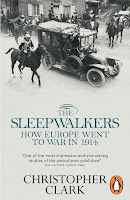 Staff review by Chris Saliba
Staff review by Chris SalibaIn this elegant and exhaustively researched history, Australian historian Christopher Clark endeavours to explain the complicated and often irrational politics that led to the First World War.
One hundred years on from the First World War, Australian historian Christopher Clark has dug deeply into the war literature to try and figure out how and why it started. The result is perhaps more confusion. If anything, there appears to have been a lack of clarity on the part of Europe’s political elites. Politicians, diplomats and monarchs all worked at cross purposes. Adding to the mess was the sheer number of countries that jostled amongst themselves for power, prestige and position.
It’s a great credit to Christopher Clark that he can work such a bewildering mess of information into a manageable narrative. The Sleepwalkers starts in Serbia, examining the Pan-Slavic movement that aimed to unite all Slavic people. It is perhaps Serbia that is emblematic of the confused and contradictory politics that was rife throughout early twentieth century Europe. Serbia had a monarchy and a civilian political class that didn’t work in concert. The Serbians also had a bad habit of murdering their kings and queens. Added to this was a secret underground web of Serbian nationalist groups keen to undermine their neighbour, Austria-Hungary. The civilian politicians knew about these shady groups, watched them with keen interest, but didn’t try to rein them in. Out of this potent mix came the six assassins who plotted the murder of Archduke Franz Ferdinand. It was Gavrilo Princip that would fire the shots that killed the Archduke and his wife, triggering the First World War.
The Sleepwalkers examines all the other European countries at war and the peculiarities of their political systems, showing how communication and messaging was often poor, nonexistent or simply contradictory. Not only did these countries have poor internal systems of communication, their international communication was worse. Nor was Europe served by a particularly brilliant set of leaders. Many were vain, lazy thinkers living in a fairy land of imperial illusions. They led rich, technically advanced nations and spent huge amounts building up their armies, without much thought about the consequences of unleashing so much cutting edge weaponry. There’s a fair degree of magic thinking on the part of Europe’s leaders at this time. Romantic and unrealistic ideas of war prevailed.
Interestingly, Clark’s revisionary history doesn’t find Germany to be the power mad monster of popular imagination, while Great Britain is shown to be condescending to other European nation states, often exacerbating antagonisms. This is a brilliant history that combines shrewd analysis with exhaustive research. Clark’s writing is sophisticated and intelligent. His overall thesis passes the common sense test. There is much to satisfy in this magisterial work.
The Sleepwalkers: How Europe Went to War in 1914, by Christopher Clark. Published by Penguin. ISBN: 9780141027821 RRP: $24.99
To sign up for our monthly newsletter, featuring new releases, book reviews and favourite articles from around the web, click here.
No comments:
Post a Comment